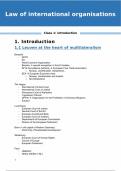Law of international organisations
Class 1: introduction
1. Introduction
1.1 Leuven at the heart of multilateralism
Brussels
- NATO
- EU
- World Customs Organisation
- Benelux special recognition in the EU treaties
- EFTA Surveillance Authority European Free Trade Association
o Norway, Liechtenstein, Switzerland…
- EEA European Economic Area
o Norway, Liechtenstein and Iceland
o Not Switzerland
The Hague
- International Criminal Court
- International Court of Justice
- Permanent Court of Arbitration
- Yugoslavia Tribunal
- OPCW Organisation for the Prohibition of Chemical Weapons
- Europol
Luxemburg
- European Court of Justice
- General Court of the EU
- European Investment Bank
- European Court of Auditors
- Departments of European Commission
- Division of the European Parliament
Bonn (= old capital of Western Germany)
- World City of Sustainable Development
Strasbourg
- European Court of Human Rights
- Council of Europe
- European Parliament
Paris
- UNESCO
- OECD (OESO in NL)
1
, - European Space Agency (ISA)
London
- International Maritime Organization (IMO)
- Commonwealth
Geneva
- United Nations
- World Trade Organization
- CERN
- World Health Organization
- International Labour Organization
- International Telecommunication Organization
- WIPO
Vienna
- United Nations
- UNCITRAL
- IAEA
- OSCE: Organization for Security and Cooperation of Europe
- ION
- UNODC
o Important office for drugs and crime
- FRA: Fundamental Rights Agency of the European Union
Rome
- Food and Agriculture Organization
- UNIDROIT: international organization that strives for the unification of private
international law
- World Food Program
Madrid
- UNWTO: World Tourism Organization
1.2 Not international organisations
The following organisations are not IO’s, because they are not created by a government
- International Chamber of Commerce (Paris)
- International Committee of the Red Cross (Geneva) is a sui generis actor of
international law
2
,1.3 The invasion of international
organisations
- Between 500 and 700 IO’s in the world
o There are more IO’s than states
- Enormous diversity:
o Bilateral, trilateral, multilateral, global:
Bilateral (BE-NL): Nederlandse Taalunie
Trilateral: Benelux
Multilateral: EU
Global: UN
o Intergovernmental – supranational:
Interngovernmental: government representatives dominate the working
of the organization
Governments are using them to empower themselves
Government representatives (diplomats, ministers)
Supranational (eg ECJ, European Parliament): organs have an
autonomy
Above the MS
Organs of that organization do not represent MS interests
Are not composed of MS representatives
o Fields of activity: highly specialized – very broad
Very broad: EU and UN, more political
Technical: others
- Ever stronger impact on domestic legal systems, on policy-making and on individuals:
e.g.
o UN Security Council counterterrorism resolutions adopt all kind of
measures:
Blacklisting of terrorist suspects
o Technical standardization from radio waves to GDPR
o From labor standards to cybersecurity
- For example: European Union
o EU itself has almost the whole world accredited to it
o 170 non-EU members states accredited to the EU
o Commission, EP, Council of Ministers
- Crisis of multilateralism: reasons
o Polarization
MS pushing their own candidates without competence in high posts
(employment agency)
The Netherlands have donation to World Bank for deputy
o Age:
UN: 75 years, permanent seats in SC to winners
Powerful states pull the strings
o Lack of renewal
Facing problems in the world for which they were not designed (e.g.
NATO for SU)
Including other things: crisis operation, out of area operations (Kosovo,
Libya)
Broaden their tasks but not their treaty – is this legal?
o Lack of commitment of countries
Bigger countries
Political will and participations
3
, US and current president calls them outdated
Populist leaders and dictatorial leaders
1.4 Practical
Course materials
- Sourcebook: compilation of primary sources (VRG)
- Reader: mandatory reading materials (VRG)
- Handbook: International Law: a European Perspective (Acco, J. WOUTERS, C.
RYNGAERT, T. RUYS)
- Powerpoint slides and exercises
Exam: written open-book exam
- 3-4 case studies, essay questions
2. History
International organizations = a relatively recent phenomenon
- The “concert system”: Congress of Vienna (1815), Concert of Europe >< ad hoc
nature, no membership (“on invitation”), unanimity
- Permanent associations/unions
o Central Commission for Navigation on the Rhine (CCNR, 1815), European
Commission on the Danube (1856)
o International Union of Railway Freight Transportation (1890)
o International Telegraph Union (1865)
o International Metereological Organization (1873)
o General Postal Union (1874; “Universal” since 1878))
o International Office of Public Health (Paris, 1907)
o Economic areas: Metric Union (1875), International Copyright Union (1886),
International Sugar Union (1902), International Institute of Agriculture (1905)
Interesting experiments with majority voting, regulatory powers, representation of non-
State interests (dependent territories, businesses,…), budget
20th century
- The League of Nations and International Labour Organization (ILO) as a pioneer
international organizations
o Covenant of the League of Nations/Constitution of the ILO, both adopted 28
June 1919 (Sourcebook)
o League of Nations (volkenbond):
Doesn’t exist anymore, now we have UN
Originally 45 MS, max 60 (1934), 54 (1939)
60 states: pretty universal because of all the colonial states
Unstable because a lot of withdrawals (eg Italy)
Three main organs: Assembly, Council, Secretariat
Assembly: plenary meeting, each Member 1 vote
Council: permanent members (US Germany/USSR, Britain,
France, Italy, Japan) + four (later 6, 9, 11) elected members
Secretariat: Secretary-General (Eric Drummond, Joseph
Avenol) and staff
International civil services
Invented by the League of Nations
Status and guarantee for independence
League of Nations not effective in maintaining security
4




